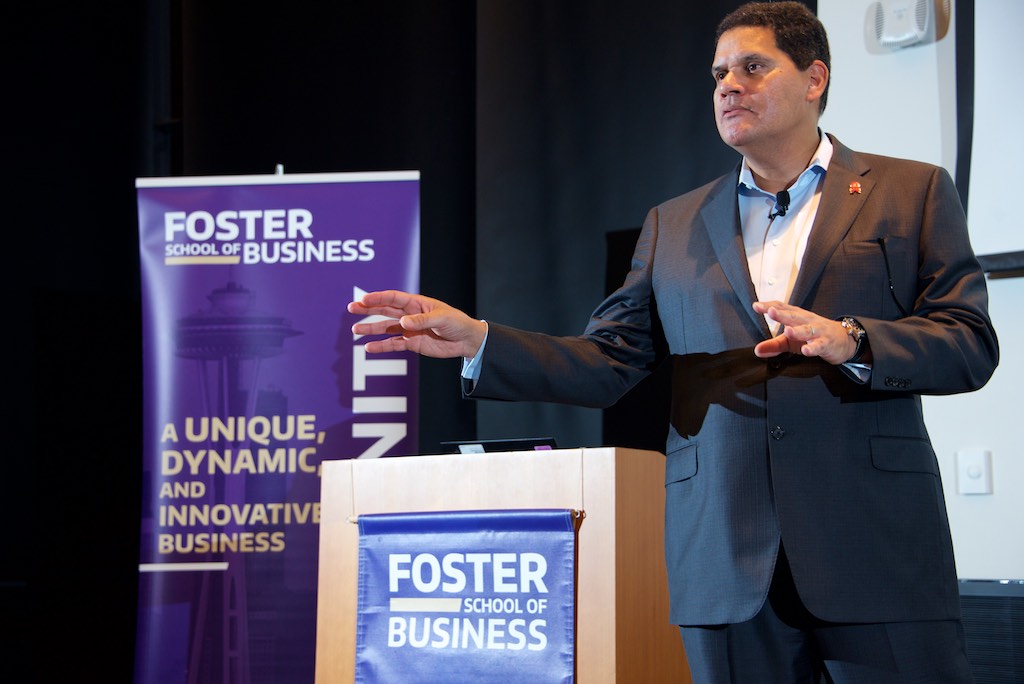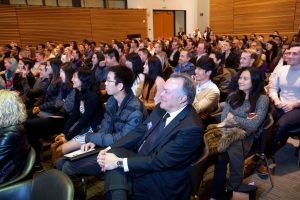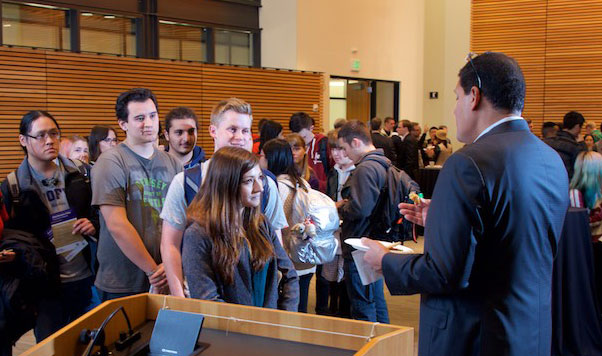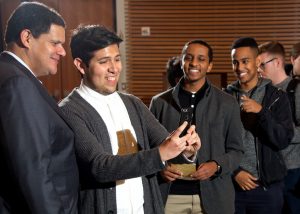Change your playbook: Reggie Fils-Aimé, President and COO of Nintendo of America, talks global strategy

“The only thing you can trust about your playbook is that it will change.”
Who could have predicted that Nigeria would become the third largest market for Guinness, or that a small Japanese playing card company would become one of the most innovative forces in the video game industry? Reggie Fils-Aimé, President and COO of Nintendo of America, has led enough global companies to know that drastic change is just part of doing business internationally.
Fils-Aimé came to the Foster School of Business—thanks to a partnership between the Tateuchi Foundation and the Global Business Center—to speak with students on global business strategy from his perspective as an American leader at a Japanese-owned, multinational gaming company.
Cross-cultural competency
 When Fils-Aimé first started working for Nintendo, he learned all the little idiosyncrasies necessary to becoming culturally sensitive and operationally effective. According to Fils-Aimé, the most interesting thing he learned was the value of silence. “When I’ve got new team members on video conference with counterparts in Japan, I urge them: don’t fear the silence,” he said. Silent pauses offer time for people to consider what they’ve heard and to properly frame a response—it means that they’re thinking, he explained.
When Fils-Aimé first started working for Nintendo, he learned all the little idiosyncrasies necessary to becoming culturally sensitive and operationally effective. According to Fils-Aimé, the most interesting thing he learned was the value of silence. “When I’ve got new team members on video conference with counterparts in Japan, I urge them: don’t fear the silence,” he said. Silent pauses offer time for people to consider what they’ve heard and to properly frame a response—it means that they’re thinking, he explained.
Of course, these small cultural differences have a major impact on product development too. For example, video game consoles are more popular in the US, while handheld gaming is more popular in Europe and Asia. According to Fils-Aimé, this preference for different product categories across continents can be partly explained by cultural differences: house sizes in the US provide the space needed for larger consoles, while mass transit commuting in Asia and Europe provides extra time for handheld gaming.
The only thing you can trust about your playbook is that it will change.
But, continued Fils-Aimé, some cultural stereotypes don’t always hold true in practice, like the commonly held belief that Japanese companies are risk-averse. As Satoru Iwata, Nintendo’s global president from 2002-2015, once said, “Other companies run from risk; we run towards it.”
Running toward risk
This innovative mindset can be seen in Nintendo’s product development, from the Wii’s motion controls, to the glasses-free 3D display of the 3DS. “We really have no choice but to take risks,” said Fils-Aimé. When your competitors have a much larger budget to work with, you have to do something different because you’re never going to win in a dollar-for-dollar battle, he explained.
During his time at Nintendo, Fils-Aimé has seen their playbook change multiple times. To help explain Nintendo’s drive to innovate, and how they compete in a global market, he suggested the book The Innovator’s Dilemma. “Companies are often unwilling to do something other than what’s already working,” said Fils-Aimé.
 In the case of the video game industry, processing power has always attracted a certain customer base, so Sony and Microsoft tend to focus on promoting superior computing power. But Nintendo sought to disrupt this market focus on processing power. “Disruption looks to focus on underserved markets to create opportunity,” said Fils-Aimé. By launching the Wii, a game system so easy that anyone could play it and love it, the Nintendo successfully introduced new audiences to their products and intellectual property.
In the case of the video game industry, processing power has always attracted a certain customer base, so Sony and Microsoft tend to focus on promoting superior computing power. But Nintendo sought to disrupt this market focus on processing power. “Disruption looks to focus on underserved markets to create opportunity,” said Fils-Aimé. By launching the Wii, a game system so easy that anyone could play it and love it, the Nintendo successfully introduced new audiences to their products and intellectual property.
#NoFilter
Another example of Nintendo’s ability to adapt their playbook and take risks is the way they communicate to their consumers. E3 is a show sponsored by the game industry where major manufacturers and publishers unveil their new products on stage. The audience at E3 includes multitudes of media analysts, which companies rely upon to be the conduit of information and excitement to consumers. According to Fils-Aimé, they had to impress show attendees in order to impress consumers, and participating companies started doing much more elaborate stage shows.
Companies are often unwilling to do something other than what’s already working.
But as we entered an era of communication channel proliferation, due to advances in the internet and social media, Nintendo realized it was time to change their playbook, explained Fils-Aimé. “There was no reason to only count on journalists to tell our story to the players; we could tell it ourselves,” he said.
In 2006, they posted online the first installment of “Iwata Asks,” in-depth interviews between then-president Iwata and the designers of individual titles. In 2011, they added “Nintendo Direct,” a video series that became like smaller E3 presentations about new games. “This was a kind of distributed storytelling that didn’t involve a filter, and didn’t require us to wait for an industry gathering to communicate,” said Fils-Aimé.
The latest example of this method of distributed storytelling is their recent announcement of their new platform, Nintendo Switch. The challenge was to reach a global audience all at the same time and let them know exactly what the system was all about. “We chose an approach that was all show and no tell—let people look and start to draw their own conclusions. After all, seeing is believing,” said Fils-Aimé. The results were astounding: after the first 24 hours, the launch announcement became one of the top 20 videos ever watched on YouTube, and a global trending topic.
Org-chart innovations
 Nintendo has also changed their playbook several times on a purely organizational level, continued Fils-Aimé. When they first expanded to America in 1983, Nintendo didn’t pretend they perfectly understood the American market. So, they hired an outsider, Howard Lincoln, to help run the entire North American operation. This approach changed in 2002, when Iwata became president. “He believed, to be as good as he wanted to be at his job, he had to understand how it operated everywhere,” said Fils-Aimé. Iwata adopted a unique schedule: two weeks in Japan, one week in America, and one week in Europe every month. The playbook had changed: developers in Japan needed to understand each market better.
Nintendo has also changed their playbook several times on a purely organizational level, continued Fils-Aimé. When they first expanded to America in 1983, Nintendo didn’t pretend they perfectly understood the American market. So, they hired an outsider, Howard Lincoln, to help run the entire North American operation. This approach changed in 2002, when Iwata became president. “He believed, to be as good as he wanted to be at his job, he had to understand how it operated everywhere,” said Fils-Aimé. Iwata adopted a unique schedule: two weeks in Japan, one week in America, and one week in Europe every month. The playbook had changed: developers in Japan needed to understand each market better.
After Iwata passed away last year, Nintendo started a new chapter in their organizational playbook, explained Fils-Aimé. They formed a new Executive Officer Committee, which reports directly to the president, that is tasked with developing proposals for the entire company. It’s no longer the Japanese leadership figuring out how to do everything. Rather, it’s now “all of Nintendo from all regions working together to steer the company…it feels different, it feels better,” said Fils-Aimé. As a result, there’s more collaboration every day at every level between peers in Redmond, Kyoto, and Frankfurt, he continued.
In closing, Fils-Aimé stated that global strategy is not a one-size-fits-all challenge. “You need to find your own playbook, and then rest assured that you’ll need to change it,” he said.
Reggie Fils-Aime is one of the Global Business Center’s Asian Business Distinguished Speakers, a series funded by the Tateuchi Foundation. The Atsuhiko & Ina Goodwin Tateuchi Foundation seeks to promote and improve international understanding, knowledge and the quality of relations between Japan and the United States.
